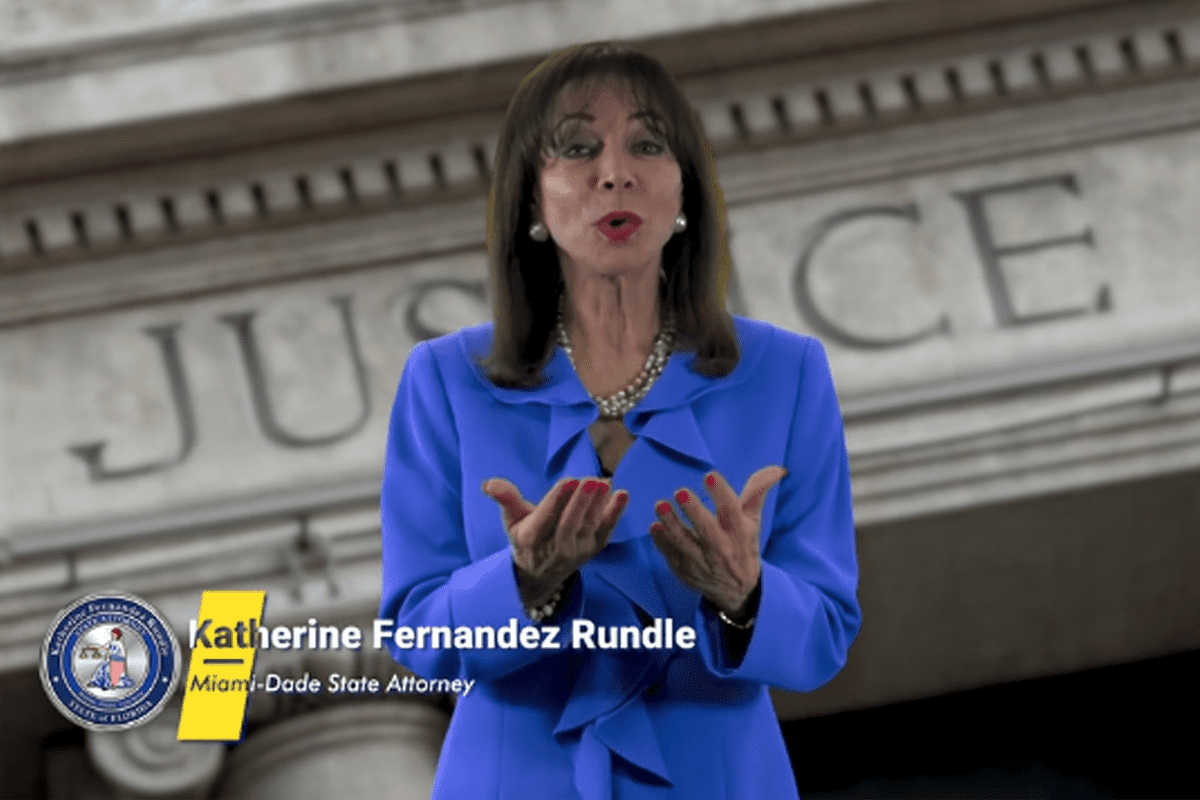Miami State Attorney Katherine Rundle Announces Arrest of Alleged Human Trafficker

MIAMI (FLV) – Miami-Dade Florida State Attorney Katherine Fernandez Rundle announced the arrest and extradition of an alleged human trafficker.
Through combined efforts of the Miami-Dade Human Trafficking Task Force, U.S. Marshals, Montgomery County police and Howard County police, 31 year-old Monriko Maquel Clements, also known by his rapper stage name King Swuise, was charged with one count of human trafficking in a first degree felony and one count of deriving support from proceeds of prostitution in a second degree felony after being accused of exploiting, drugging and branding a 23 year-old Maryland resident victim.
“We are here to announce the arrest of an alleged human trafficker from Maryland who we have just brought back to Miami to stand trial. In this operation we were also able to rescue a 23 year-old from this alleged trafficker,” said Rundle.
Rundle created a Human Trafficking Task Force unit after a national report indicated that Florida ranked number three in the U.S. for the number of human trafficking cases, and Miami-Dade County ranked number one in Florida.
According to Rundle, the 23 year-old Maryland resident was brought to Miami-Dade “specifically for prostitution purposes.”
Rundle said the victim came to the attention of the police after she jumped out of a moving vehicle on State Road 836, just east of Northwest 27th Avenue in November. Highway Patrol Officers who came upon the scene reported that the victim said Clements was hitting her while he was driving a rental vehicle.
The Highway Patrol Officers reached out to the Florida Department of Law Enforcement who then contacted the Human Trafficking Task Force.
“Imagine, she jumped out of a moving car, causing injury or death because she could not think of a better way to avoid the beating that she alleged Clements was giving her because she did not want to engage in prostitution anymore,” said Rundle.
Rundle said the victim “attempted to escape” by contacting relatives and police for help, which led to an investigation by the city Police Department. The victim indicated there was no physical abuse and later said she was “afraid” to speak up. Rundle said after Clements and the victim left, she leaped from the rental vehicle and Clements fled the scene and was eventually tracked down in Maryland and taken into custody.
“Our victim later said she said that because she was afraid, this is what happens, they’re so afraid to speak up and she was afraid that he would take action against her. When they got in the car, sure enough Clements, when they got in the car to leave, he started beating her for reaching out to her relatives and to the police for help,” said Rundle. “This is what eventually led to our victim leaping from the vehicle and coming to the police attention. Clements, when she leaped out and she was rescued, he kept in route on 836 and he fled the scene. He was eventually tracked down in Maryland and taken into custody and he has now been returned to Miami-Dade County to face the justice and accountability that’s deserved.”
The victim reportedly met Clements in April through an internet dating site and later they began a relationship. Clements invited her to see him perform at a strip club in Baltimore where they initially met in-person.
Clements tattooed his rapper name, King Swuise, on the victims’ body. Rundle said this is a “common action” in human trafficking cases to show that the victim is a “possession” and “owned” by the trafficker.
“We’re emphasizing this because this is a common practice unfortunately in all kinds of cases [….] Tattooing a name on a human trafficking victim is another common action and it’s taken by the alleged trafficker to show that the victim is a possession owned by that trafficker,” Rundle explained.
The victim stated that after three weeks of being in a relationship with Clements, she lost her job and then was “extremely worried about how she was going to provide for herself and her children.” Clements then suggested prostitution as a way for her to make “fast money.”
“Clements told her that he knew of a way for her to make fast money: prostitution. Clements allegedly began organizing the prostitution activities from the beginning to the end and he would keep all the money,” said Rundle.
According to Rundle, Clements set up an “advertisement” on a prostitution website using nude photos of the victim. The victim stated that Clements “set up” prostitution dates in hotel rooms for her.
“The victim stated that the subject would set up prostitution dates in hotel rooms, he would reserve the hotel rooms, he was in complete control of this complete operation,” said Rundle. “Once the hotel room was reserved and the victim was in the hotel room, the subject would advise her of the details of the dates he just set up. For instance, he would tell the victim by text, ‘the one you’ve got coming now is 15-120.’ The victim stated that this type of instruction from the subject meant $120 for 15 minutes of sex.”
According to Rundle, the victim said that Clements gave her cocaine and MDMA regularly, which she said is “another common thing” that alleged human traffickers do to make their victims “dependent” on the trafficker.
“Clements started giving her cocaine and MDMA which is a form of molly, regularly, almost daily. Supplying drugs is another common thing that these alleged human traffickers do and it’s intended to make their victims pliable and dependent on the trafficker,” she went on.
Rundle said drugs and violence are “professional tools” used by human traffickers and they see victims as “walking ATM machines.”
“As you can see, drugs and violence, these are the professional tools used by these human traffickers to bend each victim to the traffickers’ will. Human trafficking victims are manipulated into unending sale of their humanity so that their supposed traffickers, their ‘boyfriends’ can live well on the flow of cash only that victim can provide,” said Rundle. “To traffickers, these victims are not human beings, they’re simply a commodity. These traffickers just view these victims as walking ATM machines. They sell youth and they sell sex. In this particular instance, Clements, her alleged trafficker, to him, this woman was cash on high heels.”
Regional Director of the Florida Department of Law Enforcement Troy Walker said the case is a “reminder that human trafficking is a very real problem” and the success of this investigation “is an example of how good government works.”
“Let this investigation be a reminder that human trafficking is a very real problem in our communities and human traffickers, they have no conscience or no regard for human life and nor do they have a place in our community [….] The success of this investigation, this is an example of how good government works when it’s predicated in collaboration and partnerships. These partnerships keep our community safe,” said Walker.



